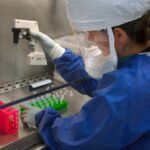A PhD position in forensic genetics is available at the Department of Medical Biology with the research group Forensic Genetics. The position is for a period of four years. The nominal length of the PhD program is three years. The fourth year is distributed as 25 % each year and will consist of teaching and other duties. The objective of the position is to complete research training to the level of a doctoral degree. Admission to the PhD program is a prerequisite for employment, and the program period starts on commencement of the position.
The Centre for Forensic Genetics is a public DNA analysis laboratory. The Centre is accredited for forensic genetic analyses, including analyses of biological traces and reference samples for the police and the legal system. We handle approximately 15% of all case work analysis in Norway.
As a university laboratory we have a strong focus on research and education. Our research projects focus on improving and implementing new molecular methods applied in forensic analysis case work.
The workplace is at UiT in Tromsø. You must be able to start in the position within a reasonable time after receiving the offer.
The project / The position’s field of research
The research project aims to advance the field of forensic genetics by refining and developing methodologies for the identification and characterisation of biological stains. Biological stains from crime scenes, such as blood, saliva, semen, and other body fluids, are routinely analysed for DNA in order to identify the donor of the stain. In contrast to DNA, that is identical in all cell types, cell-specific molecules, such as proteins and RNA, can be used to gain additional information about which cell type or body fluid a sample consists of. This information may be helpful to disentangle the course of events at a crime scene. However, their accurate identification and detailed characterisation remain challenging, particularly from scarce and degraded crime scene samples.
This project will leverage state-of-the-art technologies alongside innovative approaches to enhance the reliability, sensitivity and specificity of biological stain analysis. The PhD candidate will be responsible for conducting wet-lab experiments using molecular techniques for RNA analyses, different genotyping methods, such as PCR and capillary electrophoresis, next generation sequencing and single cell analysis, as well as utilising bioinformatics tools for data analysis.
Required qualifications
- A Norwegian master’s degree or foreign equivalent in molecular biology, biotechnology, biomedicine, molecular medicine, forensic sciences, or related discipline
- Demonstrated strong written and oral communication skills in English.
Preferred qualifications
- Research experience via Master`s thesis and/or job experience in forensic genetics.
- Experience in working with RNA and/or single cell analysis
- Good laboratory skills.
- Good computer skills / data processing skills/ bioinformatics skills
- Good communications skills.
Benefits
- Involvement in an interesting research project
- Good career opportunities
- A good academic environment with dedicated colleagues
- Flexible working hours and a state collective pay agreement
- Pension scheme through the state pension fund
- PhD Fellows are normally given a salary of 550 800 NOK (46.973,14 EUR)/year with a 3% yearly increase.
Organization/Company – UiT The Arctic University of Norway.
Research field – Biological sciences » Biological engineering. Biological sciences » Biology. Chemistry » Molecular chemistry. Chemistry » Biochemistry
Research profile – First Stage Researcher (R1).
Country – Norway.
Application Deadline – 28 Nov 2025 – 23:59 (Europe/Oslo).
More information: Euraxess







Leave a Reply